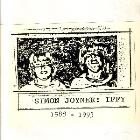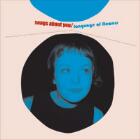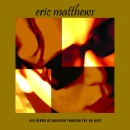3 Music Reviews
Simon Joyner, Iffy (Unread Records)

Bright Eyes may be all over Newsweek and such as the voice of Americana (and I'm not criticizing him for it, don't get me wrong), but there's another Omaha, Nebraska musician who has been plumbing the depths of his soul and writing about American pain in a even more ramshackle, visceral and uncontrolled way. Iffy, originally on cassette and re-issued by Unread Records on vinyl, collects the earliest of Simon Joyner's recordings, from 1988-1993. It's a wonderfully rough ride through childhood memories, midwestern landscapes, and the sheer pain of death and heartbreak. Iffy kicks off with the perfectly titled "The Simultaneous Occurrence of True Love and Nausea at a South Omaha Burger King Oct. 12, 1992" and proceeds from there through a gloriously ragged hodgepodge of homemade folk music cut through with manic punk energy. "Another American looking for the real America," Joyner screams about D. Boon at the album's end, and it could describe him as well - Joyner probes into his own life in such an incisive way that he couldn't help but be investigating his home town, and home country, at the same time. In that way it's very personal music that's about all of us, really, but not self-consciously so. Self-deprecating and quite funny, but also filled with humbly poetic passages and perfect descriptions of moments and feelings, Simon Joyner's music is complicated, and god bless him for that. - dave heaton
Language of Flowers, Songs About You (Shelflife)

Add Language of Flowers to the ever-growing category of "pop bands which most people are likely to write off as just pretty or too happy-sounding, even though to describe them that way you'd have to be listening in the most cursory of ways." In other words, the basic sound of Songs About You is lovely pop, with catchy melodies, super-pretty vocals (from singer Tara Simpson, whose voice occasionally reminds one of The Sundays, though it's more direct), and an overly upbeat sound, with the group's two guitarists carefully adding rock accents throughout. Yet underneath the bouncy musical optimism are really honest and piercing examinations of matters of the heart. Songs like the infectious "If It's Not You" and "Botanic Gardens" are as catchy as any song you'll hear, nicely tilting towards pop radio of decades past ('50s girl groups and '80s new wave, especially) while also sounding new and fresh. But they also contain perfect expressions of fear, confusion, and loneliness. The album's first track, "Where You Belong," is a moving song about trying to figure out where a relationship stands ("you say that you're back for good / and I wonder / wonder what for good means this time"); other songs throughout - both ballads that are sad in tone and compressed pop tunes - echo the feeling that human beings are complicated, that our feelings are hard to pin down but music can help us figure them out. - dave heaton
Eric Matthews, Six Kinds of Passion Looking for an Exit (Empyrean Records)

Eric Matthew once created sensitive pop arrangements as half of the duo Cardinal, and all of his solo albums since have built off of that experience. Matthews is becoming ever more adapt at placing instruments together in ways that are graceful and filled with emotion. His latest album Six Kinds of Passion Looking for an Exit is no exception - it's a lush pop album with a romantic sheen to it. And seldom does he rely on waves of strings or horns to fill the songs out; here it's often just guitars and drums, yet the same feeling is here, as if there's an orchestra hidden inside a small rock band. As an example of pop arrangements, then, Six Kinds... is nothing but a success. So why does it feel so hollow? Matthews sings emphatically about his emotions, but somewhere between the speakers and my ears something is lost. To me the album is only successful as an intellectual exercise (listen to how well he placed that particular sound there); as an emotional experience it's un-moving. The only time he manages to communicate something in a personal-sounding way, it's on a near-disco song ("Do You Really Want It?") that sounds more frivolous than anything else on the album. - dave heaton
Copyright © 2005 erasing clouds |
|